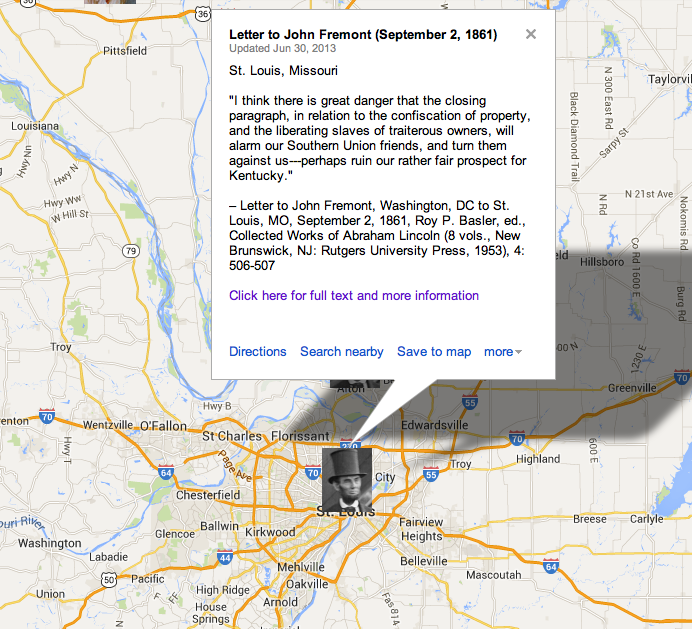Contributing Editors for this page include Thomas Warf
Ranking
#57 on the list of 150 Most Teachable Lincoln Documents
Annotated Transcript
“Two points in your proclamation of August 30th give me some anxiety.”
On This Date
HD Daily Report, September 2, 1861
The Lincoln Log, September 2, 1861
Custom Map
Close Readings
Posted at YouTube by “Understanding Lincoln” course participant Thomas Warf, August 2014
How Historians Interpret
“Frémont’s political blundering upset Lincoln more than his military ineptitude. On August 30, the impulsive, flamboyant, grandiose Pathfinder of the West issued a proclamation establishing martial law throughout Missouri, condemning to death civilians caught with weapons behind Union lines, and freeing the slaves and seizing the property of rebels. Before issuing this fateful decree, he had consulted his wife and a Quaker abolitionist but no one in the administration. While the Northern press generally lauded the Pathfinder’s emancipation edict, residents of the Bluegrass State indignantly denounced it as ‘an abominable, atrocious, and infamous usurpation’. . .Lincoln gently but firmly urged Frémont to rescind the emancipation order, which went beyond the Confiscation Act passed by Congress in early August, freeing only those slaves directly supporting Confederate military efforts. . .The quarrelsome Frémont, who was temperamentally reluctant to follow orders and predisposed to ignore others’ feelings, rashly declined to modify his decree without being instructed to do so. He argued that if ‘I were to retract of my own accord it would imply that I myself thought it wrong and that I had acted without the reflection which the gravity of the point demanded. But I did not do so. I acted with full deliberation and upon the certain conviction that it was a measure right and necessary, and I think so still.’ Defiantly, Frémont ordered thousands of copies of the original proclamation distributed after the president had demanded its modification. Reluctantly, Lincoln complied with Frémont ’s request for a direct order and thus ignited a firestorm of protest. His mailbag overflowed with letters denouncing the revocation. Pro-secession Missourians took heart. One observer reckoned that the president’s action ‘gave more ‘aid and comfort to the enemy’ in that State than if he had made the rebel commander, Sterling Price, a present of fifty pieces of rifled cannon.'”
NOTE TO READERS
This page is under construction and will be developed further by students in the new “Understanding Lincoln” online course sponsored by the House Divided Project at Dickinson College and the Gilder Lehrman Institute of American History. To find out more about the course and to see some of our videotaped class sessions, including virtual field trips to Ford’s Theatre and Gettysburg, please visit our Livestream page at http://new.livestream.com/gilderlehrman/lincoln

